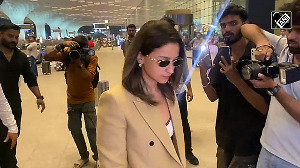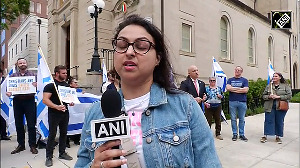In conversation with Archana Masih, Professor Hasan speaks about how India must create an egalitarian society, the leaders who shaped the country for the better and why students politics has degenerated over the years.
What is it that really fills you with a sense of euphoria about India, what is it that really makes you proud?
Euphoria -- no, but the progress that India has made, has been a slow but steady progress. The fact that India is competing with many advanced and industrialised nations is a matter of considerable satisfaction.
At the same time we have more than 40 per cent people living below the poverty line. A large number of children and women have no access to education, water or basic civic amenities which makes you wonder what we have achieved in 60 years.
What are then your greatest concerns?
My concerns are that we should be able to create an egalitarian society and that egalitarian society must have a place for the poor. The poor must have equal access to whatever opportunity exists and that the rich do not get richer and the poor don't get poorer.
My concern really is that the presence of a very large impoverished population does not lend itself to stability and peace.
When you look back into history, who are the leaders that according to you have shaped India for the better?
Certainly Gandhi. He was the architect of India's independence. Certainly he had offered to us a certain blueprint which is worth examining over and over again.
Certainly the architect of post Independence India, Jawaharlal Nehru, who not only provided a blue print but also presented a certain vision and if we individually and collectively nurture that vision then surely many of our problems will be sorted out.
I am not saying all of what he said is relevant today but a lot of what he said is relevant today. I think we should take a look at his thoughts and ideas before we dismiss them as being old fashioned.
Are there any leaders in recent times who have impacted India for the better?
I think Mrs (Indira) Gandhi also did to a very considerable extent. She for the first time put garibi as the principle national agenda or project and that was surely very significant. I also think there are a large number of people at the state level who have made a very significant contribution -- Jyoti Basu in Bengal is a leader with impeccable credentials who put Bengal on the right track so to speak. There are various leaders in Tamil Nadu, Kerala.
Post Gujarat do you think the distance between Hindus and Muslims has increased? What is the sense that you get?
I don't think it has increased. It's not as if the Muslims perceived the Hindus as the enemy. It is not as if the entire Hindu community rallied around the VHP and the goons of Narendra Modi. That was not the case.
Gujarat probably sensitised both Hindus and Muslims living across the country that how important it was for them to live together separately. I am using the world 'living together separately' in a positive sense.
How important it was to have harmony between the two communities because the result of communal violence on this scale is not only the killings of the minorities but tremendous dislocation of everything for the majority. You lose a lot of money, trade, other opportunities, you lose the possibility of attracting investment, the image outside the country is tarnished, so nobody wants it unless people are mad.
I think the lesson that many people have probably learned from Gujarat is that it is best to live in harmony. Also Gujarat very clearly demonstrated to an average Indian that communal riots are engineered. The fires of hatred are stoked by politicians principally and there exists a clear-cut nexus between the politicians, the police, businessmen, and traders.
So that is also something that is very significant and if there is a consciousness among the people about who is doing it then probably on another occasion we may find these people standing up against this nexus and not letting communal riots take place.
Many believe Gujarat took Hindu-Muslim relations way behind.
Maybe in Gujarat it did but not in the rest of the country. In the rest of the country it has had a sensitisation which is probably good for the country.
Do you feel that Muslims have to proclaim repeatedly that they are secular to prove that they are truly secular?
Well they don't have to. I don't think Muslims need to. They are as secular as any other group. They are as loyal to the country as any other group so those who call upon Muslims to prove their loyalty are themselves anti-national. And those who go out of the way to establish their loyalty are so completely feckless and so completely weak and so completely defensive that I can only pity them.
Is it difficult to be a Muslims post 9/11 where your faith is constantly questioned?
No. In such situations ones faith is fortified. A death in the family doesn't shake your belief in the almighty god if you are a believer. Young people lose their parents. Parents lose children but they don't give up. Life goes on.
Islam is not a religion which has kind of emerged in somebody's backyard. It has been around for a thousand of hundred years and there are 1.4 billion people who are Muslims. So to imagine that their faith would be shaken is not right.
Islam is the fastest growing religion -- even in the United States of America.
As a teacher, do you think India has enough resources to fulfill the aspirations of its youth?
The youth have to create opportunities for themselves. The government will have to create structures within which it will be possible for the aspirations not just of the youth but the aspirations of the poor people to be met.
In a country which had a tradition of honouring its gurus, a professor dies on campus in Ujjain after being lynched by his students. Why has student politics fallen to such depths in India?
Principally because of the lack of ideology. Once ideologies like Marxism, Gandhism, Socialism were an important factor. That bought a degree of content and dignity to student politics as well as general politics. Now the absence of ideology has given rise to lumpenism.
The instance of Professor Sabharwal are instances of lumpenisation of politics. These people are there not because they believe in anything or that they wish to achieve anything but they are there because they want to make money or they are there because they are representatives of political parties so unlike the previous decade, goondagardi has become the most important asset for joining politics.
If you are a decent person you will not be able to get elected within the radius of this office.
When did student politics start taking a turn for the worse?
It has been a steady process which is also not to say that all student politics is bad. I think students politics is good. Student unions can become a very effective vehicle and must exist in every university.
But students also have to accept the principle of checks and balances. They also have to realise that universities have to run in the interest of the teacher and the student.
It can't be run for the benefit of half a dozen office bearers and their friends.
Compared to about 10 or 15 years ago, what are the students of today like?
They are sharp, have access to much greater information, are much more ambitious, competitive, and desirous of making it good.
Photograph: Seema Pant






